|
Limitar tu búsqueda
[+–] Creator
- Acevedo, Germán (2)
- Bertranou, Fabio (2)
- Blair, Randall (2)
- Borraz, Fernando (2)
- Calderón-Madrid, Angel (2)
- Campuzano, Larissa (2)
- Cox-Edwards, Alejandra (2)
- Delgado, Guilherme C. (1)
- Eskenazi, Patricio (2)
- González, Nicolás (2)
- James, Estelle (2)
- Levy, Dan (2)
- Martínez, Gabriel (1)
- Moreno, Lorenzo (2)
- Pagés, Carmen (2)
- Premand, Patrick (2)
- Pérez Yarahuán, Gabriela (2)
- Querino, Ana Carolina (1)
- Rodríguez-Oreggia, Eduardo (2)
- Sadoulet, Elisabeth (2)
- Scott, John (1)
- Vakis, Renos (2)
- Wong, Rebeca (2)
- de Janvry, Alain (2)
- de la Fuente, Alejandro (1)
[+–] Editorial
[+–] Fecha
[+–] Formato
[+–] Idioma
[+–] Tipo de documento
[+–] Tipo de recurso
[+–] Classification
|

|
|
El impacto de género de la reforma a la seguridad social en América
Las reformas recientes hechas a los sistemas multi-pilar estrechan el vínculo entre las contribuciones salariales y los beneficios, conduciendo a que los críticos arguyan que éstas reformas perjudicarán a las mujeres, quienes tienen un empleo menos continuo y ganan menores salarios que los hombres. Sin embargo, estas reformas también eliminan distorsiones y enfocan las redistribuciones hacia los...
|
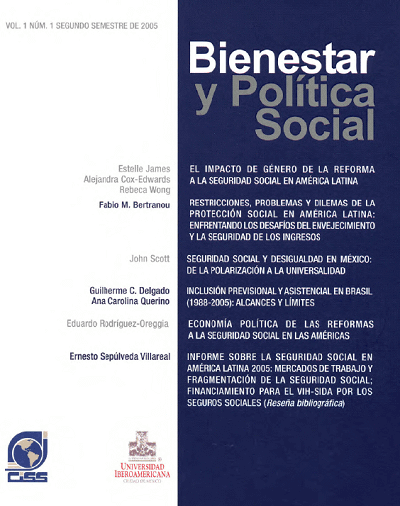
|
|
|
|

|
|
Restrictions, problems and dilemmas of social provision in Latin America: facing challenges from aging and income inequality
This paper discusses the main restrictions, problems and dilemmas that social provision faces in Latin America in a context of demographic changes and low achievements in the economic performance, particularly in the labor market. It is proposed the need to adapt the general social provision matrix as function of priorities and restrictions set by financing access. Due to the limited labor...
|
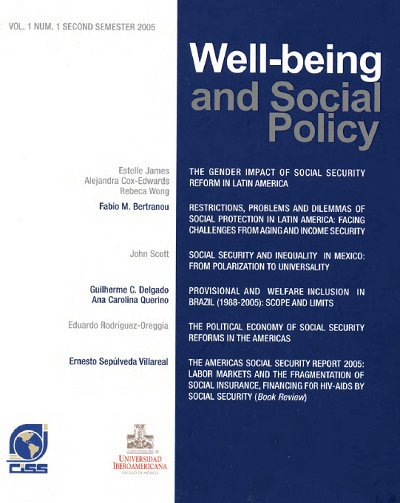
|
|
|
|

|
|
Hurricane Mitch and consumption growth of nicaraguan agricultural households
There is little micro-evidence on the persistence of natural disasters' welfare impacts. This paper assesses the effect of Hurricane Mitch on consumption of Nicaraguan agricultura) households. Mitch occurred in October 1998. Pre-post data is obtained from a nationally representative panel collected in 1998 and 2001. An additional survey was fielded in 1999 for households from the panel affected...
|
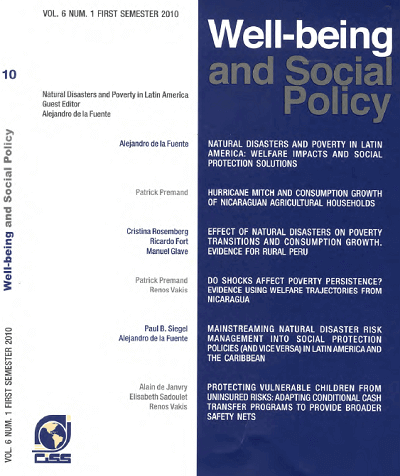
|
|
|
|

|
|
Book review. Informe de evaluación de la política de desarrollo social en México 2008, CONEVAL
The Evaluation Report on Social Development Policy in Mexico was published by the National Council for Social Development Policy Evaluation (CONEVAL) in 2008. The Council is one of the constituting elements of the new institutional framework to evaluate the public sector performance, particularly social development policies that were put in place mostly during the first decade of this century....
|
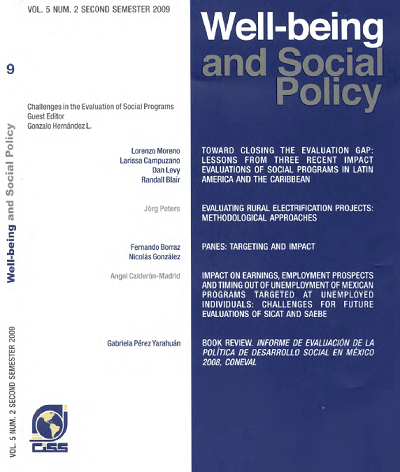
|
|
|
|

|
|
Impact on earning, employment prospects and timing out of unemployment of mexican programs targeted at unemployed individuals: challenges
his paper presents estimates of the impact of programs for unemployed workers on the performance of program beneficiaries in Mexico. We emphasize the significance of applying methodologies capable of avoiding statistical bias attributable to unobserved variables when measuring the impact on earnings and allowing to us properly estimate unemployment duration and work status after exiting from...
|
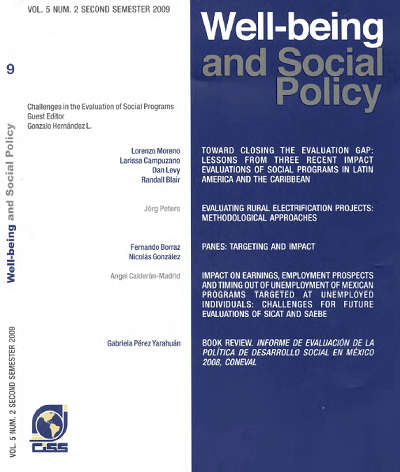
|
|
|
|

|
|
PANES: targeting and impact
This research paper intends to quantifit targeting performance in terms of the efficiency of the 1 National Plan for Social Emergency Assistance (PANES) implemented in Uruguay between 2005 and 2007 and determine its impact on relevant issues such as school attendance, child labor and the labor market. For this analysis , we used 2006 and 2007 Continual Household Survey (ECH) data.
Our outcomes...
|
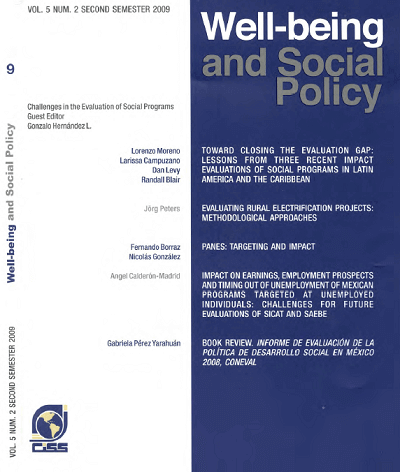
|
|
|
|

|
|
Toward closing the evaluation gap: lessons from three recent impact evaluations of social programs in Latin America and the Caribbean
Despite recent growing demand from funders and governments, rigorous impact evaluations in Latin America and the Caribbean remain the exception rather than the rule. Many commissioned impact evaluations are methodologically weak, and thus only marginally useful in assessing the impact of social interventions. Other impact evaluations feature strong research methodologies at their conception, but...
|
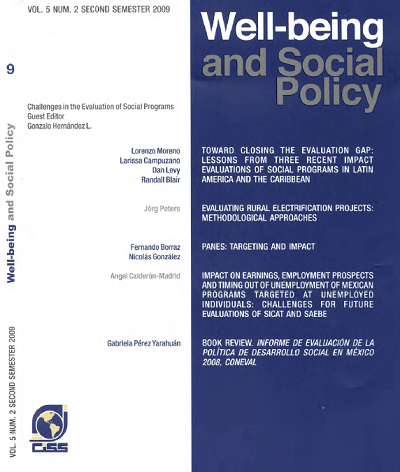
|
|
|
|

|
|
Unemployment insurance in Chile: a new model of income support for unemployed workers
This paper describes the Chilean experience concerning the implementation of a new unemployment insurance (UI) program. The use of individual savings accounts and private management are essential elements. In addition, a redistributive fund (Common Fund) helps workers pool risks, distributing resources from employed to unemployed workers and from stable firms to workers with low incomes and...
|
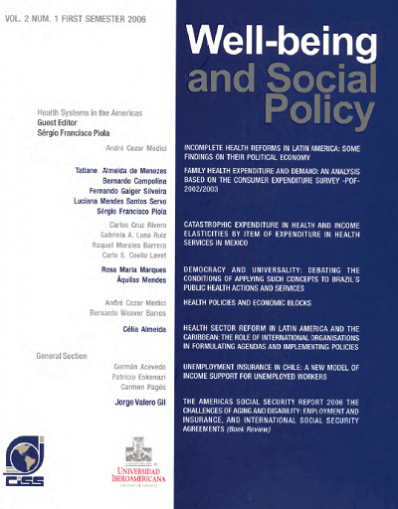
|
|
|
|

|
|
The political economy of social security reforms in the Americas
This paper analyses the factors affecting the decision to apply a reform (parametric and structural) in the Americas, which may hold a specific set of conditions, i.e. a sui generis political system and a high degree of economic openness, among others. Economic freedom is relevant in the case of structural reforms, while results for the share of older population are not conclusive. It may be that...
|
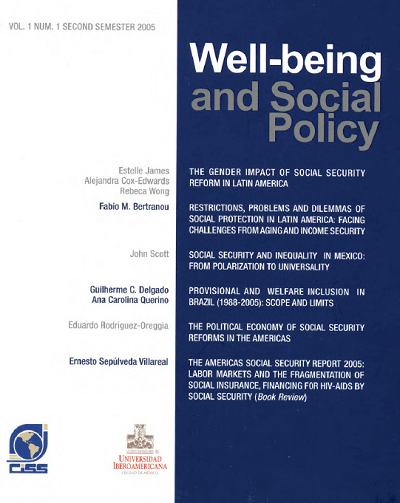
|
|
|
|

|
|
Provisional and welfare inclusion in Brazil (1988-2005): scope and limits
This paper analyses the influence of new rights derived from the Social Security System in Brazil after the Federal Constitution (1988). At least, three different and independent forces determinate the arrangements in social security policies: 1) the new social rights created by constitutional rules in response to social pressure; 2) the decrease of employment and wages in salaried jobs imposed...
|
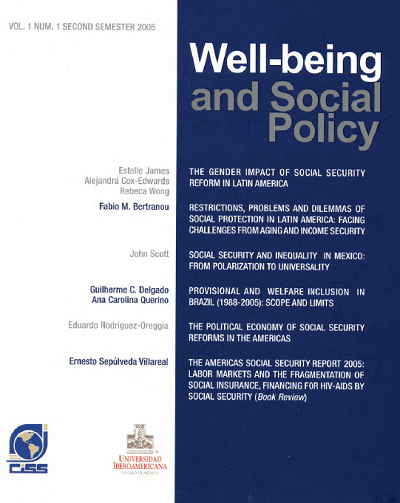
|
|
|
|

|
|
Social security and inequality in Mexico: from polarization to universality
The article documents the failure of social security in Mexico as an instrument of social protection and evaluates possible reform strategies. It analyses the truncated coverage of these systems for the most vulnerable, the regressive incidence and horizontal inequities of public social security subsidies, and the consequences for old-age poverty and inequalities in basic health opportunities. It...
|
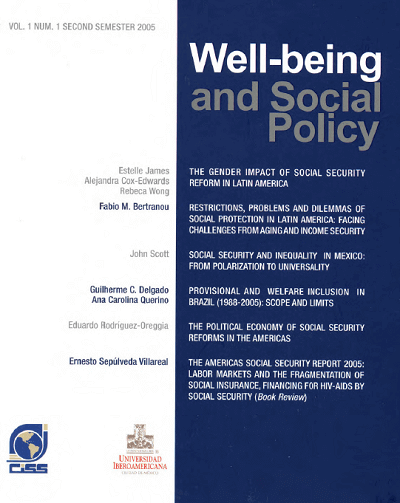
|
|
|
|

|
|
The gender impact of social security reform in Latin America
Recent multi-pillar pension reforms tighten the link between payroll contributions and benefits, leading critics to argue that they will hurt women, who have less continuous employment and earn lower wages than men. However, these reforms also remove distortions and target redistributions to low earners, which help women. This paper tests these conflicting claims in the case of three Latin...
|
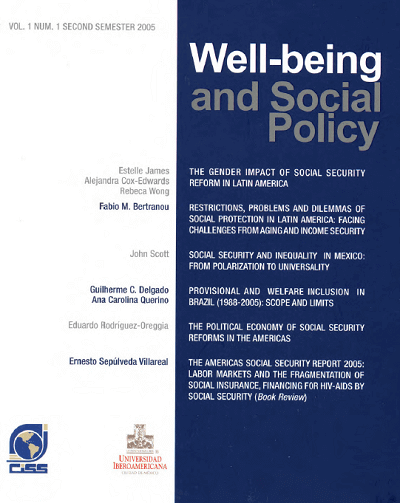
|
|
|
|

|
|
Restricciones, problemas y dilemas de la protección social en América Latina: Enfrentando los desafíos del envejecimiento y la seguridad de los ingresos
Este artículo discute las principales restricciones, problemas y dilemas que enfrenta la protección social en América Latina en un contexto de cambio demográfico e insuficientes logros en el desempeño de la economía, particularmente en el mercado laboral. En el mismo se plantea la necesidad de readecuar la matriz general de provisión de protección social en función de una redefinición de...
|
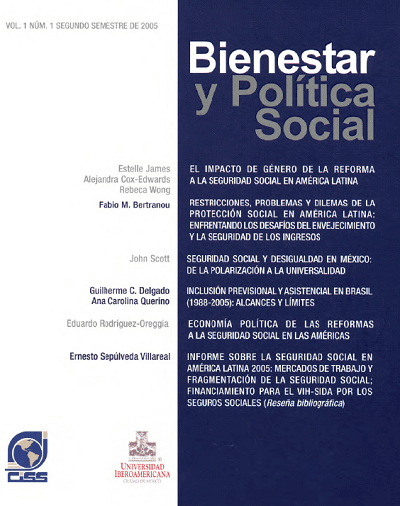
|
|
|
|

|
|
Introducción (sobre los sistemas de protección social que se aborda en el presente número de la revista)
La construcción del estado de bienestar en México inició en torno a los años de la Gran Depresión y la Segunda Guerra Mundial, como una gran movilización nacional que a su vez formó parte de un compacto global para mejorar las normas laborales y establecer sistemas nacionales de seguridad social. La Conferencia Interamericana de Seguridad Social se fundó en 1942 en apoyo a ese movimiento. En este...
|
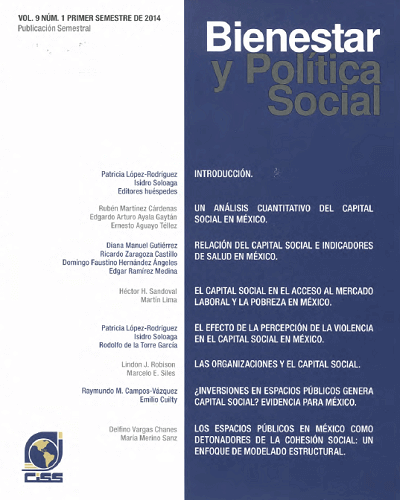
|
|
|
|

|
|
Cómo proteger a los niños vulnerables de los riesgos no cubiertos: adaptación de los programas de transferencias condicionadas en efectivo para ofrecer redes de protección social más amplias
Se ha comprobado que los programas de transferencias condicionadas en efectivo (CCT, Condicional Cash Transfers) son efectivos para inducir a las familias con pobreza crónica a invertir en el capital humano de sus hijos mientras ayudan a reducir la pobreza. También han protegido al capital humano infantil de los choques que afectan a estas familias. En este artículo, argumentamos que muchas...
|
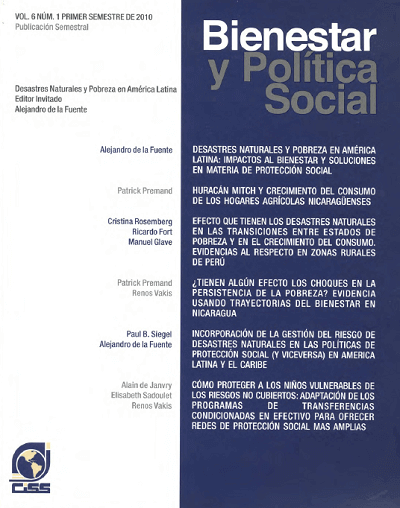
|
|
|
|

|
|
Huracán Mitch y crecimiento del consumo de los hogares agrícolas nicaragüenses
Existe escasa micro-evidencia sobre la persistencia de los impactos de desastres naturales en el bienestar. Este artículo evalúa el efecto del Huracán Mitch, ocurrido en octubre de 1998, sobre el consumo de los hogares agrícolas nicaragüenses. Los datos pre-post utilizados provienen de un panel representativo nacional recolectado en 1998 y 2001. Una encuesta adicional se realizó en 1999 para...
|
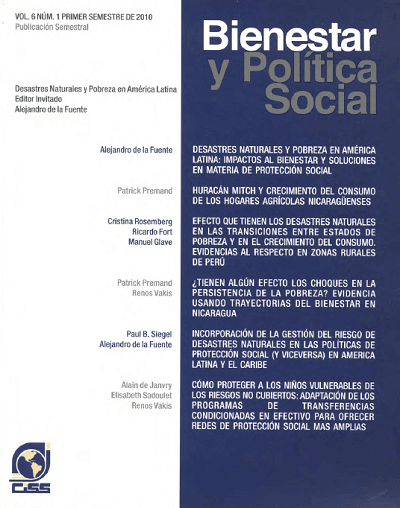
|
|
|
|

|
|
Desastres naturales y pobreza en América Latina: impactos al bienestar y soluciones en materia de protección social
Los países de América Latina se encuentran en constante (y creciente) riesgo de ser azotados por desastres naturales. Tan solo, México ha sufrido la peor sequía en seis décadas; en el noreste del país se registraron pérdidas históricas en 2010 debido al huracán Alex, y luego, hubo graves inundaciones en varios estados del sur. Chile (al igual que Haití semanas atrás) captó la atención de todo el...
|
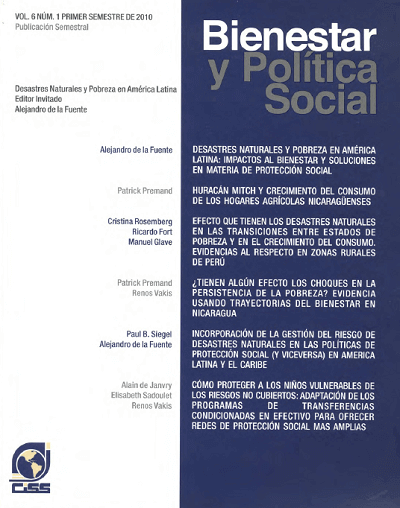
|
|
|
|

|
|
Reseña del informe de evaluación de la política de desarrollo social en México 2008, CONEVAL
El Informe de Evaluación de la Política de Desarrollo Social fue publicado por el Consejo Nacional de Evaluación de la Política de Desarrollo Social (CONEVAL) en 2008, y forma parte de los componentes del reciente andamiaje institucional sobre evaluación del sector público, particularmente de la política de desarrollo social, que fue generado mayormente en su estructura
actual durante la primera...
|

|
|
|
|

|
|
Retos para la medición de impacto en remuneración, empleabilidad y tiempo de salida al empleo de beneficiarios de los programas de apoyo a desempleados en México SICAT y SAEBE
En este trabajo presentamos estimaciones de impacto que los programas de atención a trabajadores desempleados tienen en el desempeño de sus beneficiarios en México. Enfatizamos la importancia de aplicar metodologías que logren, por un lado, evitar sesgos estadísticos atribuibles a variables no observadas al medir impacto en remuneración y por otro lado que permitan estimar adecuadamente duración...
|
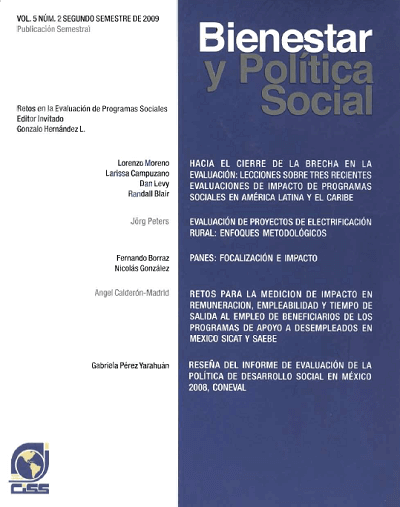
|
|
|
|

|
|
PANES: focalización e impacto
El objetivo de esta investigación es cuantificar la eficiencia en la focalización del Plan de Atención Nacional a la Emergencia Social (PANES) implementado en Uruguay entre el 2005 y 2007, y determinar su impacto en aspectos relevantes como la asistencia a centros de enseñanza, el trabajo infantil y la oferta de trabajo. Para este análisis se utilizó información pública de la Encuesta Continua de...
|
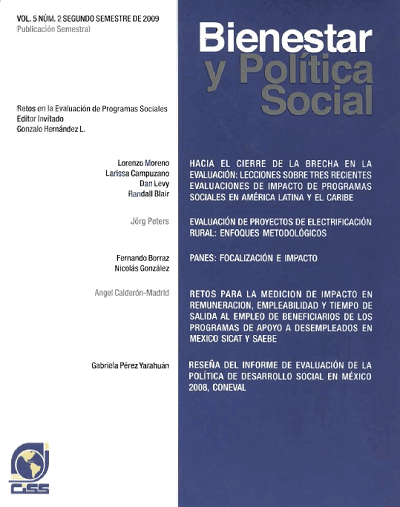
|
|
|
|
|